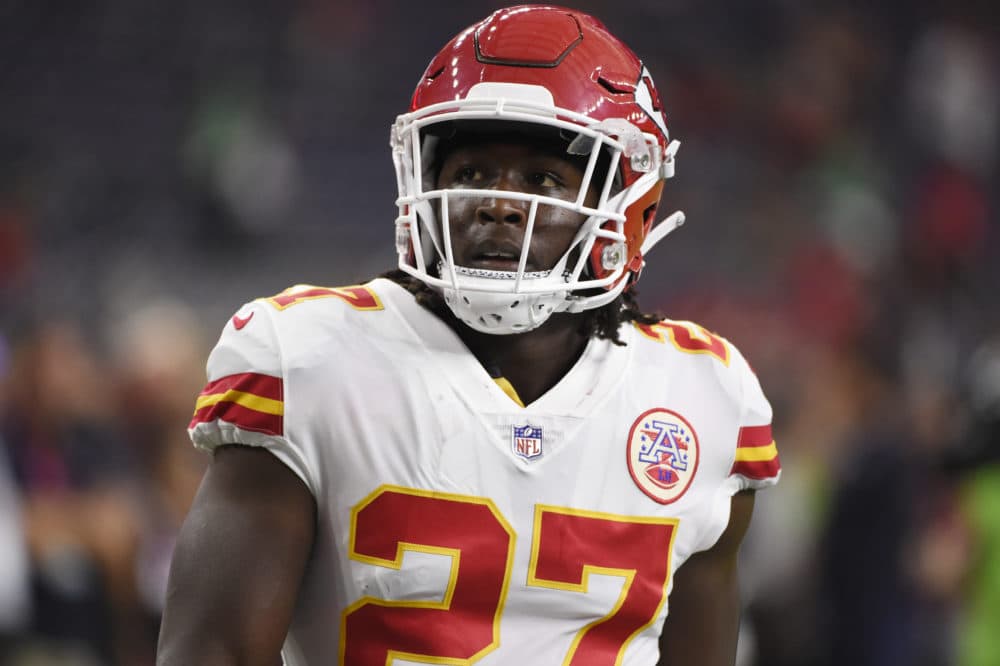Advertisement
This Season, The NFL Faced Renewed Scrutiny For How It Handles Domestic Violence
Resume
The thrill of a perfect pass from Tom Brady to Julian Edelman or Patrick Mahomes to Tyreek Hill. A powerful run down the middle of the field for hard-earned yardage. A crucial block that clears the way for a touchdown.
This is what the NFL wants you to focus on when it’s time to talk about the league and its players — not domestic violence. But near the end of the regular season, the NFL faced renewed scrutiny for how it handles violence against women.
One case involved linebacker Reuben Foster. He was arrested on a domestic violence charge in late November, released by the San Francisco 49ers, then claimed by the Washington Redskins.
The other case involved Kansas City’s star running back, Kareem Hunt.
Days after Foster’s arrest, TMZ released video of Hunt shoving and kicking a woman outside his hotel residence in Cleveland. The incident happened nine months earlier, in February, and both the Chiefs and the NFL knew back then about the alleged assault.
On Sunday, the AFC Championship game will feature a showdown between New England and Kansas City. The Chiefs made national headlines this season because they had the NFL’s No. 1-ranked offense and because they cut Hunt after the TMZ video surfaced.
“There's no question that domestic violence is treated differently within the NFL than it was before the Ray Rice video,” says Kim Gandy, president of the National Network to End Domestic Violence. “Reuben Foster probably wouldn't have been released by the 49ers. Kareem Hunt probably would not have been released by the Chiefs.”
She’s referring to the 2014 elevator video in which former running back Rice was caught punching his then-fiancée. The video and the public outcry that followed forced the NFL and its teams to reexamine how they handled domestic violence incidents.
“There's no question that domestic violence is treated differently within the NFL than it was before the Ray Rice video."
Kim Gandy, president of the National Network to End Domestic Violence
Like Foster, Hunt is on the Commissioner’s Exempt list. That means he can’t sign with a team until the league hands down a suspension and takes him off the list. But earlier this week, the Chicago Bears intimated they’d be open to pursuing Hunt.
For women working to prevent domestic violence, the headlines made by NFL players present a double-edged sword.
“The more coverage we have around domestic violence, the more we're putting domestic violence in the forefront of people's minds. So, that's the good part,” says Jessica Brayden, CEO of Respond, a Somerville-based domestic violence agency and football fan who got married in Tom Brady jersey. “The hard part about some of this coverage is it really opens up domestic violence cases to be weighed in the court of public opinion.”
And the NFL is eager to influence public opinion.
In the wake of the Hunt video release, NFL Commissioner Roger Goodell praised the way the league handled the situation.
Speaking at the NFL Winter League Meeting, Goodell said, “I think what we’re doing as a league is extraordinary. We have, I think, some of the highest standards of any organization. We take this seriously. We have zero tolerance for violence against women. As a league, I think we responded very quickly.”
That’s not a view shared by many outside the NFL.
There are plenty of cases where it appears teams care more about winning than about employing players who commit acts of domestic violence.
Case in point: Wide receiver Tyreek Hill plays for the Chiefs.
Hill pleaded guilty to strangling and punching his pregnant girlfriend in college. He was thrown off Oklahoma State’s football team. In the 2016 draft, the Chiefs selected him in the fifth round.
That sends a message, too.
“Of course there is an impact on victims all over the country,” says Gandy. "[They]
are watching these things play out and recognizing and sympathizing with the victims in those cases and even being re-traumatized by seeing these videos on television."
For Caitlin Murphy, high-profile cases can be triggering, taking her back to the physical and emotional abuse she endured, to the time her ex strangled her and broke her leg, to the fear that no one would believe her.
Murphy says when she hears about NFL players committing violence against women, “It makes me feel hopeless.” She takes a deep breath, then adds, “It makes me feel scared for my daughter. It makes me feel scared for my friends that I now know that are trying to get out of situations."
And while Goodell talks about a zero-tolerance policy, that’s not something Gandy wants to see.
“We were very clear when we talked with the NFL early on that zero tolerance is really not the best policy,” says Gandy. “You want to do a full investigation. You want to understand what happened. You want there to be consequences.
“But if the consequences are earth shattering, then that will make victims even less likely to report. If you talk to victims of domestic violence, for the most part they don't say, 'I want him to lose his job.' They say, 'I want him to stop hitting me.' ”
Gandy, Brayden and others committed to domestic violence prevention know that public opinion will continue to influence league policy.
“Do they care about domestic violence?” asks Gandy. “They care about the public response to domestic violence, and they care about the impact on them and their ability to make money as an organization.”
And the NFL knows that domestic violence can affect their bottom line.
“But I'll take that,” says Gandy. “If they're going to take domestic violence seriously because it means that they have to do that in order to make money then it's good for victims and it's good for survivors.”
That's a win for all the domestic violence cases we don't hear about.
This segment aired on January 18, 2019.
